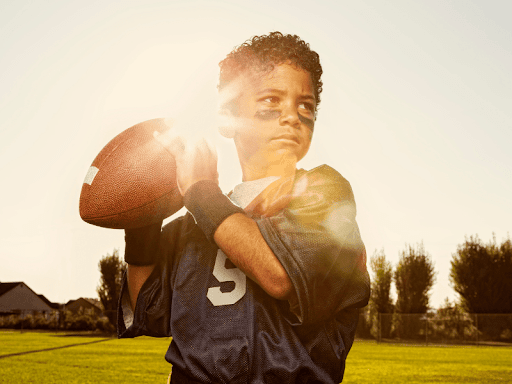The Concept of Mental Toughness
Mental toughness is far from a one-dimensional attribute. Instead, it encapsulates a broad spectrum of cognitive and emotional capacities, notably resilience, determination, and the ability to perform under pressure. This composite concept defines a mental state, propelling athletes to consistently perform towards the upper range of their abilities, regardless of the circumstances.
Young athletes with enhanced mental strength manifest several traits, including a robust self-belief in their capabilities, an innate motivation to succeed, an ability to maintain focus amidst distractions, emotional regulation, and a resilience that allows them to navigate adversities and rebound from failures.
This isn’t to say these individuals never experience doubt or negative emotions. Rather, they possess the mental fortitude to manage these experiences effectively and maintain a positive outlook, viewing setbacks as opportunities for learning and growth.
Mental toughness is an essential ingredient in a young athlete’s success recipe. It empowers them to both optimize their physical skills and withstand the psychological demands of competition and training.
The Role of Parents in Developing Mental Toughness
The family environment, and particularly the parents’ role, serves as a foundational pillar in a young athlete’s mental strength development. Parents significantly influence their children’s psychological framework and sporting experiences. Their parenting style, communication patterns, emotional support, resilience modeling, and the environment they provide for their child to experience success and failure—all contribute to the molding of a mentally tough athlete.
Evidence from developmental and sports psychology literature underscores the profound impact parents can have on their child’s mental toughness. Parental behavior shapes children’s attitudes, values, and beliefs about themselves and their sporting environment.
By fostering a supportive and encouraging atmosphere, parents can help children cultivate self-confidence, resilience, and emotional control—elements crucial to mental toughness. Additionally, parents can guide their children in developing coping mechanisms to deal with stress, setbacks, and pressure in the sporting context, a pivotal facet of mental strength.
Strategies to Nurture Mental Toughness in Young Athletes
Just as building physical strength requires strength training, building mental strength is a process. Developing mental toughness in young athletes involves equipping them with a mental toolkit to negotiate the challenges they encounter on and off the field. A variety of strategies can be employed to cultivate this mental fortitude.
Firstly, positive self-talk is a powerful tool that can bolster an athlete’s confidence and perseverance during tough times. Parents should encourage athletes to adopt affirmative internal dialogues such as “I can handle this,” thereby promoting resilience and self-belief.
Secondly, instilling a growth mindset—perceiving challenges as opportunities for learning and growth, rather than threats—can nurture mental strength. This mindset shifts the focus from pure outcome to effort and learning.

Thirdly, setting realistic goals provides athletes with a sense of purpose and motivation, further cultivating mental toughness. It’s essential that these goals align with the athlete’s skill level and personal growth trajectory.
Fourthly, emotional regulation is a key component of mental toughness. Parents should teach their children that experiencing a range of emotions in sports is normal, while also providing them with strategies to manage these emotions effectively, such as deep breathing and mindfulness techniques.
Lastly, fostering resilience—building the ability to bounce back from adversities—strengthens mental toughness. Parents should reiterate that setbacks are an integral part of sports and life, and that perseverance and tenacity define mental toughness.
The Importance of Role Modeling
As primary influencers in a child’s life, parents act as powerful role models. The behaviors, attitudes, and reactions they display—particularly during challenging situations—can significantly mold a young athlete’s mental strength. When parents exhibit resilience in the face of adversity, maintain a positive outlook during difficulties, and demonstrate healthy emotional regulation, they essentially model these behaviors for their children.
Furthermore, how parents approach success and failure can significantly shape the way their children perceive these experiences. Parents who handle their own failures with grace and positivity, viewing them as learning opportunities, instill a similar mindset in their young athletes.
Likewise, parents who celebrate their successes with humility and gratitude can inspire their children to do the same. Role modeling such attitudes and behaviors can help shape an athlete’s perceptions of success and failure, stress and pressure, and can play a critical part in the development of their mental toughness.










